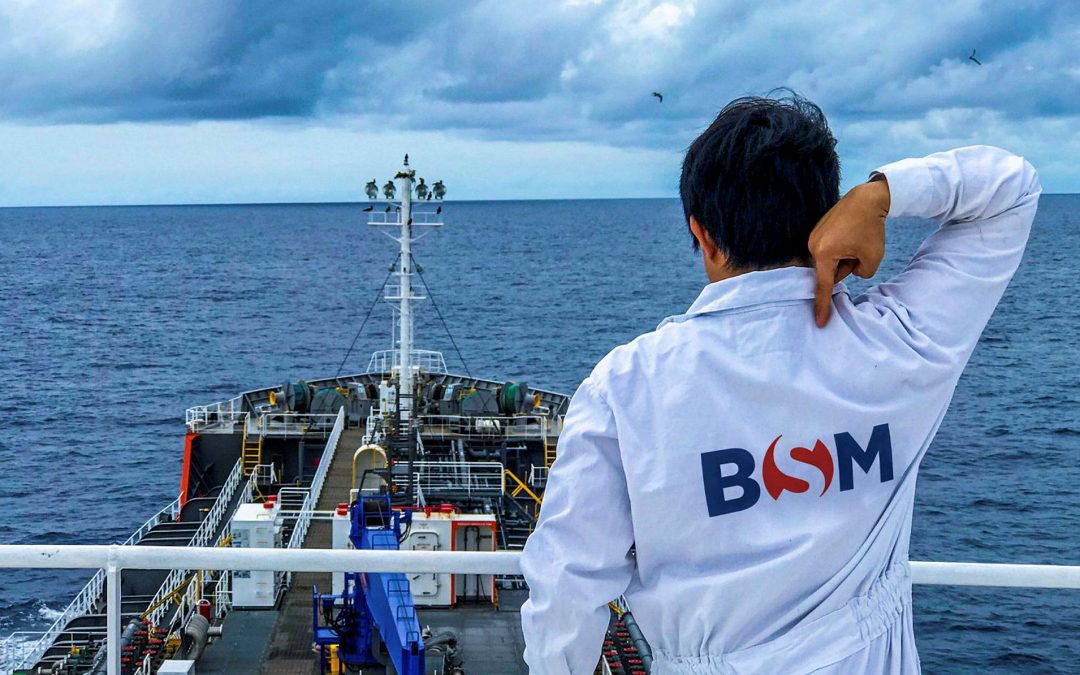As part of a research and development project, Bernhard Schulte Shipmanagement (BSM) has for the first time investigated the influence of the behavioural change of individual seafarers on carbon emissions on selected ships managed by BSM Deutschland (BSMD). Using clean-tech start-up Signol’s app, which is based on behavioural science best practice, remarkable reductions in bunker fuel consumption were detected on single ships.
Leveraging big data for greener shipping: Teaming up with London-based clean-tech company Signol, BSM studied how individual behavioural change can lead to a reduction in ships’ energy demand and carbon emissions. This is done by combining the analysis of operational data from selected BSMD managed vessels with cutting-edge behavioural science in an app and tailored communications developed by Signol.
During the research project, which ran in the second half of 2021, 60 Masters and Chief Engineers on 28 vessels under full management of BSMD were invited to take part in the trial on a voluntary basis. During this time, each participating crew member received individualised targets via the Signol app which are calculated based on the seafarer’s prior performance. Every week, the participating seafarers received updates on their personal milestones and achievements via the app and email. Through a combination of fair targets and positive feedback, Signol gently nudged individual Masters and Chief Engineers to implement fuel-saving practices.
Seafarers can be nudged to have an impact
The analysis of the pilot tests revealed promising results on single vessels which need to be verified by further tests. The R&D project proved that seafarers can be nudged and become aware of their individual influence on major challenges.
Nick Topham, Managing Director of BSM Deutschland, says, “I am pleased with the overall outcome of the pilot project as it proved our hypothesis that seafarers are not only important key workers, but also play a valuable role in the decarbonization of the shipping industry. We are impressed by the individual efforts of all participating Captains and Chief Engineers to reduce fuel consumption and CO2 emissions. In the long run, it can provide a great added value to our owners and charterers’ operations, and to the achievement of climate targets.”
Niklas Körner, Investment Manager at Innoport, is also satisfied with the promising trial run. Through Innoport, its venture capital arm, the Schulte Group has strategically invested in Signol. “The first results are very encouraging and prove Signol’s product-market fit in maritime. There is still a lot to understand about how to use behavioural change in the most effective way toward greener shipping. Applying behavioural science to vessel operations is an exciting new field for the Schulte Group which requires further research and development work to deliver even more reliable results.”
Dan White, CEO and Co-Founder at Signol, says, “The human side of operational efficiency is arguably now a crucial contributor to reducing greenhouse gas emissions (GHG). This ground-breaking work in shipping shows just how important seafarers are to our global environmental objectives and what happens when we empower them with the right feedback. These results create direct value for the environment, for business, and for the crew, and we can’t wait to work with more innovative shipping companies to deal with GHG abatement in line with the objectives for climate change.”
To better evaluate the benefits and opportunities of behavioural science, BSM intends to strengthen its collaboration with Signol and to conduct further tests with interested partners. The aim is to review and harness all possibilities to reduce the carbon footprint: technical, operational, and indeed behavioural.
What is Behavioural Science?
Behavioural science is the systematic study of human behaviour and strategies to change our approach in a target-oriented and verifiable way. In short, it is the study of what we do, why we do it, and how we can change it in a targeted way. Behavioural science combines knowledge and methods from a variety of disciplines, including behavioural economics, psychology, sociology, and neuroscience. Global players such as Google or Uber have been working for some time with their own Applied Behavioural Science research teams in order to better understand their customers and influence their behaviour. It is also being applied in the automotive industry. For example, even the smallest changes in an individual’s car-driving behaviour can have a significant impact on fuel consumption.
Source: Hellenic Shipping News






